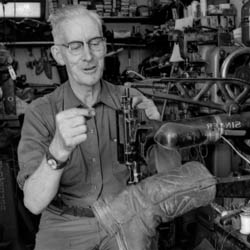Repair may be defined as remaking an object for reuse - usually by replacing a part or putting together parts which may be broken or torn. Related to repair is maintenance, which involves performing the routine functions which keep a product in good working order.
Contemporary consumers are offered a wide range of relatively disposal products. Often the low cost and convenient availability of replacements reduce the chance of goods being repaired and maintained over a long period. This is especially true when warranties have expired or the product is available in an updated version. Certainly the decline in demand for repairs, especially of electronic products, has lead to a loss in the number of qualified repairmen.
The situation was different during the Saskatchewan settlement era and during the notorious 'dirty thirties'. Potential consumers were often cash poor and a great many lived at some distance from cities and towns where a wide range of goods was readily available. In these situations there was a greater appreciation of basic, well made products that could be maintained, repaired, and adapted over the long term and for clothing that might wear well enough to be passed down to younger siblings.
Among the functions of early community blacksmiths was the production and repair of custom-made replacement parts for broken agricultural implements. During the 1920s the automobile and mechanized truck were eagerly welcomed by Saskatchewan residents. To some extent the maintenance and repair of motorized vehicles compensated for the many jobs lost by the gradual decline in 'horse' power.
Each advance in transportation - train systems, roads and highways, and airport facilities - involved both an enormous investment in construction, and a commitment to ongoing repair and maintenance. Given the wide dispersal of a small population across a large province, substantial numbers of employees have been needed to upkeep railway lines; paved and unpaved roads; telephone and electric power distribution systems; and fleets of vehicles both public and private.
The cleaning and maintenance of commercial and industrial buildings, hospitals and schools employ many workers. On the domestic front consumers depend upon plumbers, electricians, and heating contractors to see to the safety and comfort of their homes, as well as shoe repairmen and seamstresses to extend the life of their footwear and clothing.
The exhibition includes many images of laundry and dry-cleaning workers. Before electrification and the introduction of water heaters and washing and drying machines, the care of clothing was an arduous domestic task. Those who could afford the service often sent this work to local cleaning businesses which frequently provided pickup and delivery. One of the common early occupations of Chinese Canadians no longer needed for railway construction was the operation of small hand laundries. In 1914 there reportedly were 29 of these Chinese laundries in Regina; by 1940 the establishment of large steam laundries had lead to a sharp decline in their number to 8.['1']
Footnotes
↑ ['1'] Chinese Community. Accessed April 16, 2010.


![Line Crew Inspecting Telephone Lines, ['ca. 1915']](cropthumbs/MG289-gate-42.jpg)
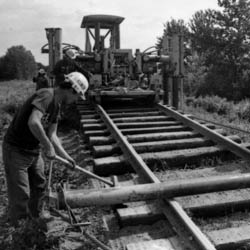
![Railway Labourers, ['between 1905 and 1915']](cropthumbs/S-B9131.jpg)
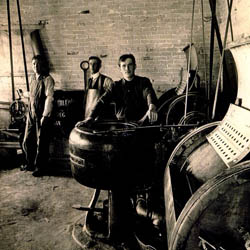
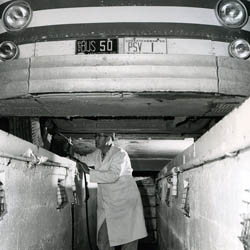
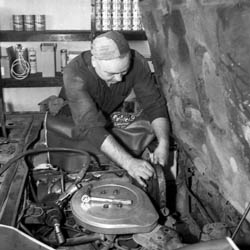
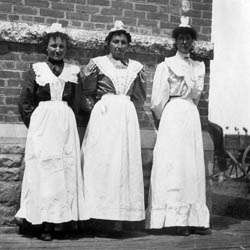
![Man and Woman Cleaning Floor, ['September 1960']](cropthumbs/B-7597.jpg)
